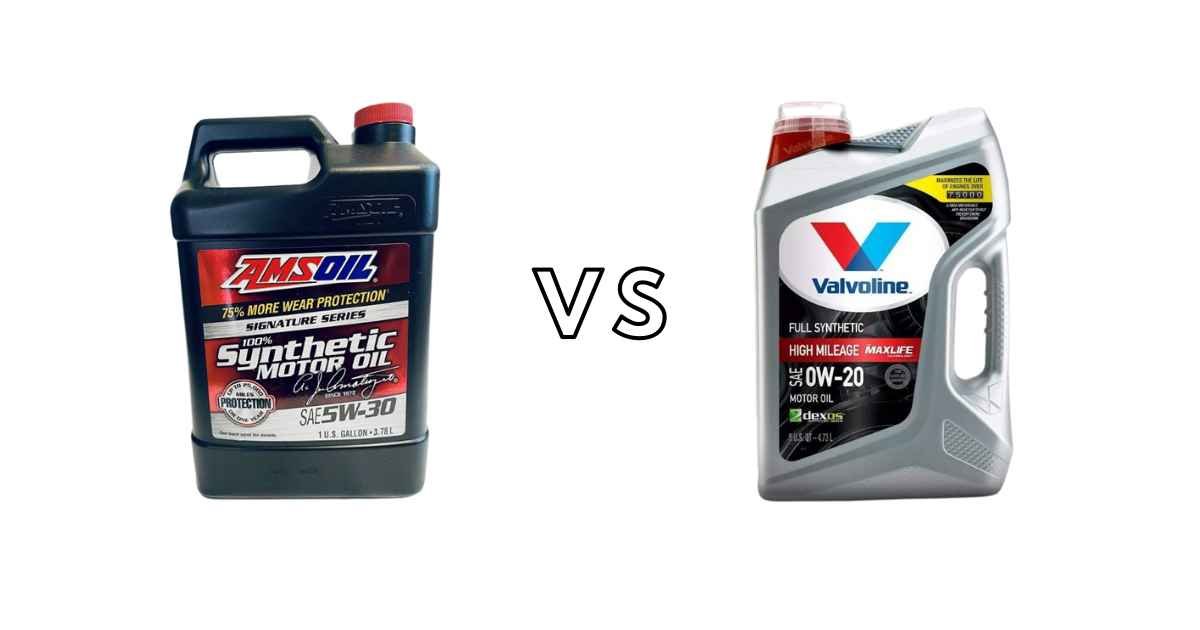Amsoil Vs Valvoline Engine Oil – Which One Is Better?
Choosing the right engine oil is mandatory if you really want to ensure better performance for your vehicle and prevent fast wear and tear of the moving parts. And when it comes to getting better engine oil, Amsoil and Valvoline are among the known names. But if you compare Amsoil vs Valvoline engine oils, which one do you think will offer the best outcome?
Amsoil is a kind of synthetic engine oil that offers better protection and improves engine performance. On the other hand, Valvoline offers both synthetic and conventional oil types, making it more compatible with a wider range of engines. And while Amsolin is pretty expensive, Valvoline is more budget-friendly.
Would you like to know more about these engine oils? Then I suggest you check out the rest of the article.
Amsoil Vs Valvoline: Comparison Table
| Features | Amsoil | Valvoline |
| Oil Type | Synthetic | Synthetic and conventional |
| Engine Compatibility | Works on different types of engine | Works on a wide range of engines |
| Viscosity Index | Low | High |
| Additive Level | Advanced | High-Quality |
| Engine Cleanliness | Good | Better |
| Oil Burn-Off | Offers less protection | Offers more protection |
| Fuel Efficiency | Efficient | Efficient |
| Availability | Not available everywhere | Widely available |
| Oil Change Frequency | 10,000-15,000 miles | 5,000-10,000 miles |
| Cost | Expensive | Affordable |
Amsoil Vs Valvoline: Detailed Comparison
Both Amsoil and Valvoline oils are known for their better performance, reliability, fuel economy, and more. However, despite some similarities, they also have some key differences. Let’s get to know more about them from the following discussion.
Oil Type
Amsoil offers synthetic oil, whereas Valvoline offers both synthetic and conventional oils. Synthetic oil is known for doing a great job when it comes to protecting vehicle engines and parts and enhancing vehicle performance.
In this regard, both Amsoil and Valvoline are reliable, and they can perform under extreme weather conditions. So if better engine performance is your target, you should go with the synthetic one.
Viscosity
Viscosity is the oil’s ability to perform in different temperatures. And both Amsoil and Valvoline oil react differently when it comes to viscosity.
The Amsoil engine oil has a low viscosity index with a higher pour point. That means this oil can easily freeze in cold temperatures.
On the other hand, Valvoline has a comparatively higher viscosity index with a lower pour point. That means it will not freeze anytime soon, even in cold temperatures.
Engine Compatibility
One of the biggest flexes of Amsoil is that it is fully synthetic oil. That gives the oil the advantage of working with different types of engines, such as racing, high-performing, diesel engines, etc.
However, Valvoline is often seen as the common choice of car drivers because it works with a wider range of vehicles. So if you want flexibility, maybe Valvoline is a better choice. Explore 2022 Hyundai Tucson hybrid problem
Engine Cleanliness
Over time, your vehicle oil will form a thick, sticky gel substance known as sludge. And sludge slowly becomes an issue and causes several engine performance problems. But if the oil has added detergent of good quality, it can fight off the sludge and keep the oil and engine clean.
Amsoil oil has a higher quantity of calcium which works as a detergent for it. It also has some amount of magnesium present. Unfortunately, this does not make much of a difference in the engine oil’s performance because it cannot fight off the sludge effectively.
But Valvoline oil has a good combination of calcium and magnesium. Though the amount of calcium is slightly lower, it has a higher amount of magnesium, which balances everything. This combination can fight sludge better and help keep the engine clean.
Oil Burn-Off Protection
The oil burn-off protection level of the engine oil is determined by its flash point temperature. If the oil has a low flash point, it usually means it burns off faster.
In this case, Amsoil has a decent but low flash point, which means it has less burn-off protection. But Valvoline has a higher flash point, meaning it will prevent fast burn-off.
Oil Change Frequency
A frequent oil change is good for the vehicle. But it also means added cost and extra hassle. So if you want less hassle, you can choose Amsoil oil, as it can go 15,000 miles or more without requiring an oil change. But if you are on Valvoline oil, you might have to change the oil every 5,000 to 7,500 miles.

Cost
Since Amsoil is a specialized engine oil and offers better protection, it usually costs more. On the contrary, Valvoline is also a superior engine oil but a cost-effective option.
Pros And Cons Of Amsoil Oil
Here are the pros and cons of Amsoil engine oil-
Pros
- Better protection against deterioration and power loss
- Improves engine performance
- Offers more cleanliness than traditional oil
- Does not require a frequent oil change
- Amsoil offers oils for different types of engines
Cons
- More expensive than Valvoline
- Not widely available
- May develop leaks
Pros And Cons Of Valvoline Oil
Here are the pros and cons of Valvoline engine oil-
Pros
- Valvoline offers high-quality synthetic and conventional oil
- Less expensive than Amsoil
- More widely available in any auto parts store or retailers
- High-quality additive offers better engine performance and protection
Cons
- Conventional Valvoline oil will not perform as well as synthetic oil
- Require more frequent oil changes than Amsoil
Frequently Asked Questions
Q. Is synthetic oil better than conventional oil?
Synthetic oil is definitely better than conventional oil. Conventional oil does offer better lubrication for your engine and parts. However, it cannot offer the same protection or enhance engine performance as synthetic oil does.
Q. Is Amsoil better than other oil?
Amsoil engine oil is far better than most traditional oils. This oil fights viscosity breakdown better and withstands the strong effect of high horsepower and modern, powerful engines. Another notable thing about this oil is that it does not require frequent oil changes.
Q. Is Valvoline a high-quality oil?
Valvoline is one of the best engine oils to find on the market. Not only does it offer better and more durable engine protection, but it also improves engine and overall vehicle performance. On top of that, Valvoline is pretty affordable.
Q. What type of vehicles are Amsoil and Valvoline compatible with?
Both Amsoil and Valvoline are suitable for various types of engines, such as diesel engines, racing engines or even many high-performing engines. That makes these oils compatible with various types of vehicles, such as motorcycles, cars, SUVs, trucks, etc.
Final Words
That was pretty much everything you needed to know about Amsoil and Valvoline oil. So which one would you choose when it comes to Amsoil vs Valvoline?
Well, Both Amsoil and Valvoline are well-known among different types of vehicle drivers, and they are also fuel efficient. However, if you want specialized oil for such engines, Amsoil should be your ultimate choice. On the other hand, if you need high-performing oil that offers extra protection at an affordable cost, Valvoline should take the crown.
Yet, in the end, it is up to the user to decide, as the type of oil you need depends on other factors too. So make sure to check all the details over and over again before you make a final decision.







